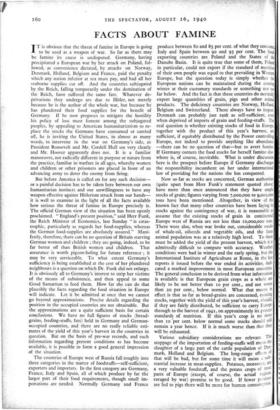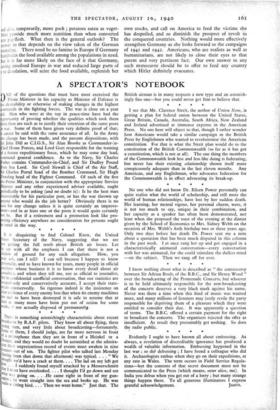FACTS ABOUT FAMINE
IT is obvious that the threat of famine in Europe is going to be used as a weapon of war. So far as there may be famine its cause is undisputed. Germany, having precipitated a European war by her attack on Poland, fol- lowed, as convenience dictated, by attacks on Norway, Denmark, Holland, Belgium and France, paid the penalty which any nation inferior at sea must pay, and had all her seaborne supplies cut off. And the countries subjugated by the Reich, falling temporarily under the domination of the Reich, have suffered the same fate. Whatever de- privations they undergo are due to Hitler, not merely because he is the author of the whole war, but because he has plundered their food supplies for the benefit of Germany. If he now proposes to mitigate the hostility his policy of loot must foment among the subjugated peoples, by appealing to American humanitarianism to re- place the stocks the Germans have consumed or carried off, he is inviting the United States, in almost as many words, to intervene in the war on Germany's side, as President Roosevelt and Mr. Cordell Hull see very clearly and Mr. Hoover apparently does not. It is a familiar manoeuvre, not radically different in purpose or nature from the practice, familiar in warfare in all ages, whereby women and children or other prisoners are placed in front of an advancing army to deter the enemy from firing.
But before America is called on for any such decision— or a painful decision has to be taken here between our own humanitarian instincts and our unwillingness to have any weapon effective against Hitlerism struck from our hands— it is well to examine in the light of all the facts available how serious the threat of famine in Europe precisely is. The official German view of the situation has been openly proclaimed. " England's present position," said Herr Funk, the Reich Minister of Economics, last Sunday " is catas- trophic, particularly as regards her food-supplies, whereas the German food-supplies are absolutely assured." Mani- festly, therefore, there can be no question of Britain starving German women and children ; they are going, indeed, to be far better off than British women and children. That assurance is worth pigeon-holing for future reference ; it may be very serviceable. To what extent Germany's sufficiency is being established at the cost of her plundered neighbours is a question on which Dr. Funk did not enlarge. It is obviously all to Germany's interest to strip her victims of the means of subsistence, and then appeal to some Good Samaritan to feed them. How far she can do that plausibly the facts regarding the food situation in Europe will indicate. Let it be admitted at once that we cannot go beyond approximations. Precise details regarding the position in the occupied countries are not obtainable. But the approximations are a quite sufficient basis for certain conclusions. We have no full figures of stocks (bread- grains, feeding-stuffs, fats) held in Germany and German- occupied countries, and there are no really reliable esti- mates of the yield of this year's harvest in the countries in question. But on the basis of pre-war records, and such information regarding present conditions as has become available, it is possible to form a good general impression of the situation.
The countries of Europe west of Russia fall roughly into three categories in the matter of foodstuffs—self-sufficient, exporters and importers. In the first category are Germany, France, Italy and Spain, all of which produce by far the larger part of their food requirements, though small im- portations are needed. Normally Germany and France produce between 8o and 85 per cent. of what they consume, Italy and Spain between 90 and 95 per cent. The food.
exporting countries are Poland and the States of the Danube Basin. It is quite true that some of them, Poland in particular, could not export if the standard of nutrition of their own people was equal to that prevailing in Western Europe, but the question today is simply whether the European nations can be maintained during the coming winter at their customary standards or something not too far below. And the fact is that these countries do normally export large quantities of grain, pigs and other animal products. The deficiency countries are Norway, Holland, Belgium and Switzerland. These always have to import. Denmark can probably just rank as self-sufficient, even when deprived of imports of grain and feeding-stuffs. The real question is whether existing stocks of food in Europe, together with the product of this year's harvest, are sufficient, if equitably distributed by the Power controlling Europe, not indeed to provide anything like abundance —there can be no question of that—but to avert famine.
If Germany corners the food stocks for herself famine else- where is, of course, inevitable. What is under discussion here is the prospect before Europe if Germany discharges the responsibility incumbent on her under international law of providing for the nations she has conquered.
Now so• far as stocks are concerned, German authorities (quite apart from Herr Funk's statement quoted above,' have more than once announced that they have ample stocks of grain; figures varying from 7,000,000 to 9,000,000 tons have been mentioned. Altogether, in view of the known fact that many other countries have been laying in stocks against the contingency of war, it is reasonable to assume that the existing stocks of grain in continental Europe west of Russia are not less than io,000,000 tons. There were also, when war broke out, considerable stocks of whale-oil, oilseeds and vegetable oils, and the farm animal population was at a relatively high level. To these must be added the yield of the present harvest, which it is admittedly difficult to compute with accuracy. Weather conditions were bad in winter and the early spring, but the International Institute of Agriculture at Rome in the last reports it issued before the war ended its activities, indi- cated a marked improvement in most European countries. The general conclusion to be derived from what information is available is that European grain crops as a whole are likely to be not better than to per cent., and not worse than 20 per cent., below normal. What that means in effect is that so far as bread-grains are concerned, existing stocks, together with the yield of this year's harvest, should, if they are fairly distributed, be sufficient to carry Europe through to the harvest of 1941, on approximately its present standards of nutrition. If this year's crop is no more than To per cent. below normal some stocks should still remain a year hence. If it is much worse than that they will be exhausted.
Various subsidiary considerations are relevant. The stoppage of the importation of feeding-stuffs will mean the
slaughter of a large part of the cattle population of Den- mark, Holland and Belgium. The long-range effects of that will be bad, but for some time it will mean a sub- stantial increase in meat-supplies. Potatoes, moreover, are li a very valuable foodstuff, and the potato crops of most parts of Europe (except, of course, the actual regions ravaged by war) promise to be good. If fewer potatoes are fed to pigs there will be more for human consumPti(51' d also, temporarily, more pork ; potatoes eaten as veget- les provide much more nutrition than when converted to pig-flesh. What then is the general outlook? The wer to that depends on the view taken of the German entality. There need be no famine in. Europe if Germany tributes the food available among the populations in need. ut it is far more likely on the face of it that Germany, ving involved Europe in war and reduced large parts of to desolation, will seize the food available, replenish her own stocks, and call on America to feed the victims she has despoiled, and so diminish the prospect of revolt in the conquered countries. Nothing would more effectively strengthen Germany as she looks forward to the campaigns of 1941 and 1942. Americans, who are realists as well as humanitarians, are not likely to close their eyes to that patent and very pertinent fact. Our own answer to any such manoeuvre should be to offer to feed any country which Hitler definitely evacuates.



























 Previous page
Previous page